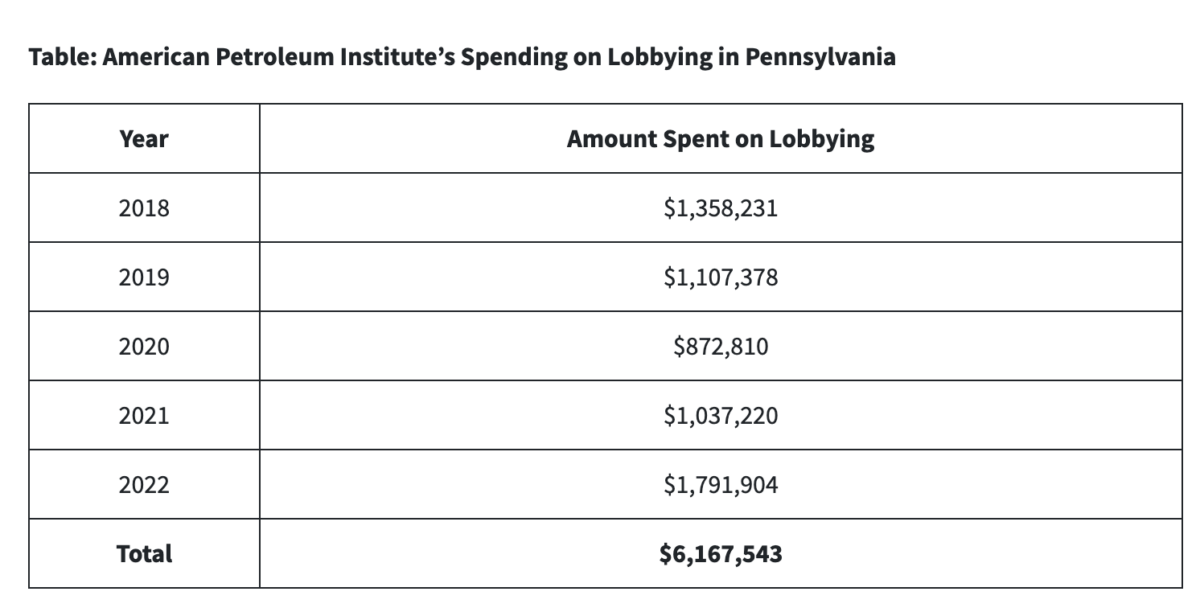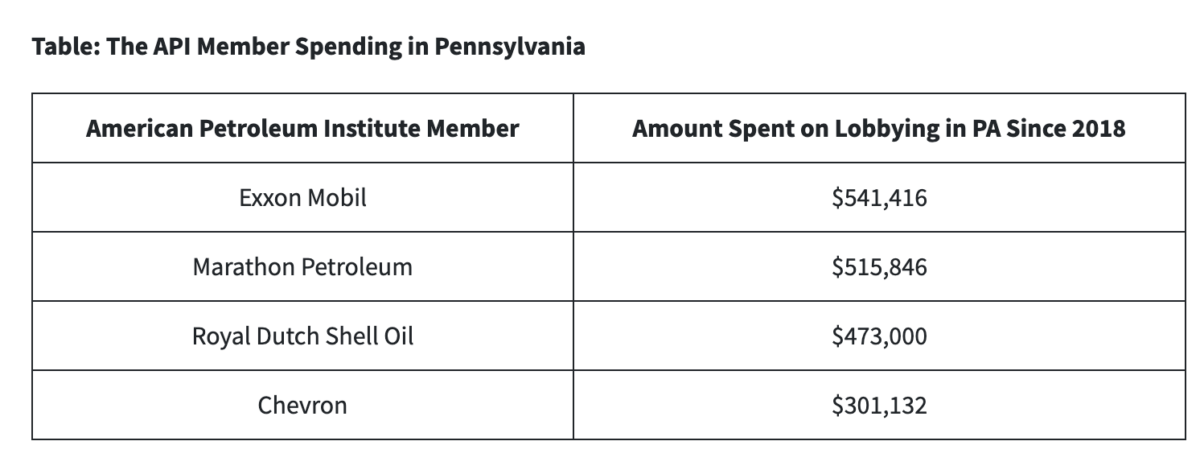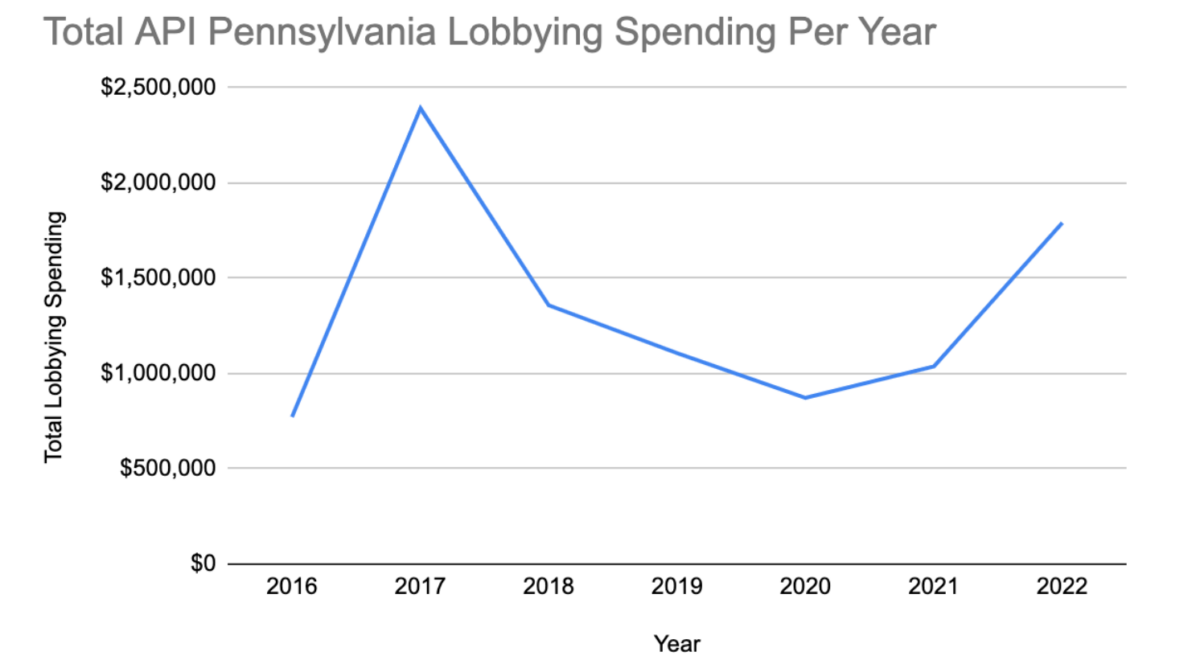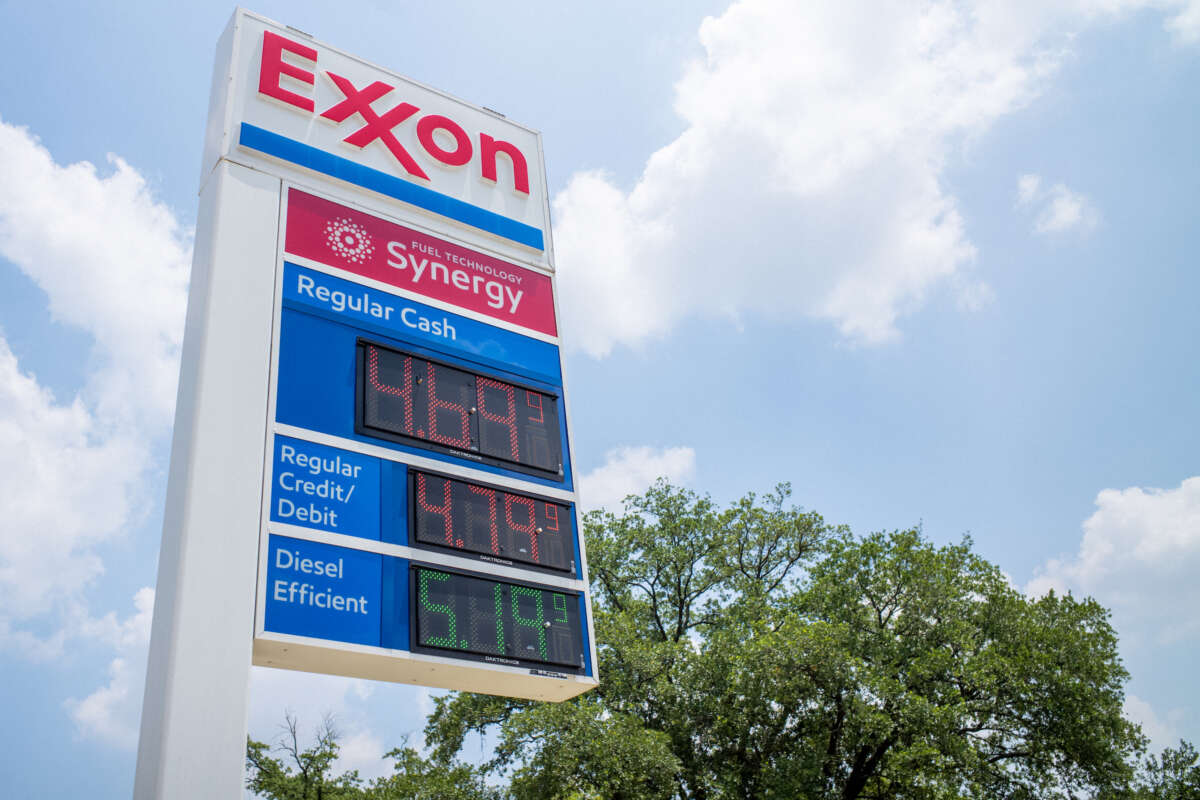The oil and gas industry is one of the most powerful interest groups in American politics. According to OpenSecrets, oil and gas corporations spent over $125 million on federal lobbying in 2022 on top of the $11.8 million spent on federal campaign contributions. These figures highlight the industry’s influence on a federal level, but the top oil and gas industry lobbying group in the United States, the American Petroleum Institute, has also made state lobbying a priority, with some success in recent years. While all states have different reporting requirements for lobbyists, state lobbying reports make one thing clear — Pennsylvania is a key focus for the oil and gas industry. In fact, at least $1.8 million was spent in 2022 and the American Petroleum Institute reports spending more money on lobbying in Pennsylvania than in any other state last year.
Pennsylvania is where the first oil well was drilled in 1859. This was around the same time as the coal industry was booming in Western Pennsylvania and contributing to the growth of Pennsylvania’s steel industry and the country’s industrial growth as a whole. In recent decades, as the coal industry declines in Pennsylvania, the natural gas industry has taken its place. The fracking and burgeoning petrochemical industry relies heavily on benefits and tax breaks from the state of Pennsylvania. The state is the only major oil and gas producing state in the United States without a severance tax on natural gas. A report from Penn Environment estimated that in 2019, the shale gas industry received around $2 billion in tax breaks in Pennsylvania, while the oil industry received around $1 billion. With these returns, it is no surprise that major oil and gas companies have spent millions of dollars on lobbying in the state capital of Harrisburg to maintain the status quo, despite increasing calls to transition Pennsylvania’s economy away from fossil fuels.
In Pennsylvania, the American Petroleum Institute spent $1,792,904 on lobbying in 2022, and has spent over $6 million in the past five years, according to the state lobbying database. Only two entities, Independence Blue Cross and the Insurance Federation of Pennsylvania, spent more on lobbying in Pennsylvania in 2022 — $3.3 million and $2 million respectively.

While the API has similar affiliates in other states such as New York, Colorado, and Kentucky, the oil companies leading the API appear to have taken a particular interest in lobbying the Pennsylvania state legislature. For example, in 2022 the API spent $377,248 on lobbying in the state of New York, about $84,000 in the most recent fiscal year in Colorado, and $61,000 in Kentucky — all well below its spending in Pennsylvania.
In addition to its lobbying efforts, the API has deep roots in Pennsylvania that allow the group and its members to exert their influence in the state. The API funds front groups that promote the fracking industry and combat legislative efforts to address climate change, and its core members like ExxonMobil and Shell have their own major influence operations in the state. All told, the API has established a powerful, well-funded machine to make sure that Pennsylvania remains a top fossil fuel producing state and that oil companies continue to make billions of dollars in profits while average residents of Pennsylvania suffer the effects of climate disasters, poor air quality, and polluted water.
The American Petroleum Institute’s History of Climate Lies
The American Petroleum Institute is the largest trade group for the oil and gas industry in the United States. Once referred to as the “whipping boy” of oil industry giants, the group works on behalf of some of the largest oil companies in the world, such as Exxon Mobil, BP, ConocoPhillips, Chevron, and Shell. The API is chaired by Chevron Chairman and CEO, Mike Wirth, who succeeded Phillips 66 Chairman and CEO, Greg Garland. In 2022 the group spent $4,380,000 on federal lobbying.
The American Petroleum Institute represents about 600 oil companies, refineries, plastic makers, and other oil and gas interests. The most powerful members like Exxon Mobil, BP, Chevron, and Shell are among the world’s leading contributors to global climate chaos. The API therefore works diligently to stall any legislative action that would address climate change. In fact, it was the American Petroleum Institute that drafted the now infamous plan by major oil companies to intentionally spread disinformation about climate change to make it a non-issue and sow doubt in the media and in the general public. The Institute and its corporate backers knew as early as 1958 that climate change could be a serious threat caused by their own industry and made the decision to lie to the American public in order to save a handful of companies’ financial future.
The Big Polluters Behind the American Petroleum Institute
According to Pennsylvania state lobbying disclosure forms, the resources for the API lobbying in Pennsylvania come mostly from Exxon Mobil, Chevron, and Marathon Petroleum. Since 2018, oil and gas companies themselves have spent millions of dollars on lobbying in Pennsylvania. Below is a table with the total amount spent on lobbying by each of the individual leaders of the American Petroleum Institute.

As the second largest producer of energy in the United States, the oil and gas industry has a particular interest in Pennsylvania. Some companies have particularly deep ties to the state. Exxon Mobil’s subsidiary, XTO Energy, is one of the largest natural gas producers in the country and holds about 534,000 acres in Pennsylvania. The American Petroleum Institute works on behalf of Exxon Mobil to push the company’s pro-fracking agenda in Pennsylvania. For example, the API lobbyists in Pennsylvania successfully fought against new taxes on the fracking industry in the state and created promotional videos touting the economic benefits of the fracking industry in Western Pennsylvania.
Marathon Petroleum also has deep roots in Pennsylvania. Before 2001, Marathon Oil (which owned Marathon Petroleum until 2011) was owned by USX, the same parent company as Pittsburgh-based US Steel. In 2012, Marathon Petroleum signed a supply agreement with Tri-State Petroleum based in Ohio, West Virginia, and Pennsylvania. This deal increased Marathon’s presence in Western Pennsylvania and the company now has several connections to the Pittsburgh business class. John P. Surma, retired CEO of US Steel and current Chairman of the Board at Marathon Petroleum, also serves on the board of the University of Pittsburgh Medical Center and is a member emeriti at the Allegheny Conference on Community Development (affiliate of the Pittsburgh Chamber of Commerce). Former CEO of Pittsburgh based, PNC Bank, James Rohr, was also a board member at Marathon Petroleum until 2021.
Shell recently opened the new Shell Pennsylvania Petrochemicals Complex, an ethylene cracker plant, in Beaver County, Pennsylvania. The API Pennsylvania’s Executive Director, Stephanie Catarino Wissman, has publicly touted the new Shell Petrochemical plant as a success story for the state despite the plant quickly making Shell one of the worst polluters in the state. Shell itself spends about $90,000 a year on lobbying in Harrisburg and has a seat on both the Allegheny Conference Board of Directors and the Pennsylvania Chamber of Business and Industry Board of Directors. Shell’s investment in influencing state and local legislators has paid off. The company not only received the largest ever subsidy in the state of Pennsylvania — $1.6 billion — to build the new petrochemical facility, but also won fifteen years of tax amnesty, allowing it to escape most state and local taxes.
The millions of dollars spent on lobbying in Pennsylvania and around the United States has helped create an extremely profitable business environment for the Big Oil corporations behind the American Petroleum Institute. According to a Reuters report, top western oil companies brought in a record $219 billion in profits in 2022, with ExxonMobil reporting $55.7 billion in profits, Shell reporting $39.9 billion in profits, Chevron reporting $35.5 billion in profits, and Marathon Petroleum reporting $16.4 billion in profits last year.
The API’s Revolving Door of Lobbyists
Despite spending nearly $2 million on lobbying in Pennsylvania 2022, the API only has two in-house lobbyists registered in the state. The two staff of the API Pennsylvania, also called the Associated Petroleum Industries of Pennsylvania, are Executive Director Stephanie Wissman, and Associate Director Jonathan Lutz.
Stephanie Wissman is the former Government Affairs Director at the PA Chamber of Commerce and served on Pennsylvania Governor Shapiro’s Energy Transition Advisory Committee in 2022.
Prior to being hired at API, Jonathan Lutz was the Executive Director of the PA State House Environmental Resources and Energy Committee for ten years. According to API, while Lutz served in his government role, he “participated in all aspects of the Department of Environmental Protection and Environmental Quality Board’s regulatory process.”
While many lobbying groups split time between direct lobbying (where lobbyists communicate directly to legislators about an issue) and indirect lobbying (where the group encourages others to take action on an issue or publish educational materials like ads), the API lobbyists in Pennsylvania spend the majority if their time on indirect lobbying, encouraging members to lobby their elected representatives, publishing op-eds, and running advertisements touting the oil and gas industry.
Pushing the Fossil Fuel Agenda in Pennsylvania
While corporations and registered lobbyists in Pennsylvania are not required to disclose what specific issues or bills they lobby on, API’s public activities can expose what some of the group’s biggest priorities are.
In 2017, for example, there was a spike in API’s spending on lobbying when the group was fighting hard to prevent state governments around the country from subsidizing nuclear plants that would benefit some of big oil’s competitors like Exelon and Entergy. Lobbyists from the API argued that nuclear subsidies were unfair and that the government should let the market decide, even while some of API’s biggest members like Shell won billions in state subsidies. Despite losing this battle in other states that decided to subsidize struggling nuclear plants, the API won in Pennsylvania. Nuclear plants in Beaver County, Pennsylvania did not receive financial assistance from the state and were in danger of closing for several years.

As LittleSis has reported on in the past, the API operates front groups to target state level environmental initiatives. According to the American Petroleum Institute’s latest 990s, the group also funds two Pennsylvania based front groups for the oil and gas industry, Citizens to Protect Pennsylvania Jobs and Citizens Against Nuclear Bailouts. The API used front groups like Citizens Against Nuclear Bailouts and other misleading ad campaigns to target their nuclear competitors in Pennsylvania. Citizens Against Nuclear Bailouts has spent over $1.85 million on lobbying in Pennsylvania since its founding in 2017, according to the Pennsylvania state lobbying database.
Citizens to Protect Pennsylvania Jobs is led by the PA Chamber of Commerce and lobbies against any new state taxes or regulations on the oil and gas industry in Pennsylvania. In the past decade, Citizens to Protect Pennsylvania Jobs has spent over $4.65 million on lobbying in Pennsylvania. Most recently, the group has been working with the API to lobby the state to make it easier for new energy infrastructure projects to be approved. Earlier efforts focused on battling any proposals for new taxes on the fracking industry. Another front group, created by Citizens to Protect PA Jobs and led by the Pennsylvania Chamber, bought television ads criticizing former Governor Tom Wolf for proposing a new shale tax and cited the API’s claims about the number of jobs that fracking has brought to the state.
The American Petroleum Institute’s power in the state has helped Big Oil powerhouse Shell win over $1 billion in state subsidies and also helped prevent any new taxes on the fracking industry. The taxpayer money given to Shell and other large corporations in the form of tax breaks could have gone towards funding public education, necessary infrastructure projects, or renewable energy projects that could address climate change and transition away from deadly fossil fuels. Currently, Pennsylvania ranks 45th in states producing renewable energy.
The nearly $2 million spent on pushing the fossil fuel agenda in Pennsylvania isn’t much to spend for an industry that brought in $219 billion in profits in 2022. But in state legislatures and Governors offices these lobbying expenditures go a long way and have the power to drown out the voices of regular Pennsylvanians impacted by climate change and the fracking industry. For the impacted communities in Pennsylvania, this means continued degradation of the land, worsening health impacts, and a state government that is more interested in propping up a wildly profitable industry than adequately funding basic public services.
Our most important fundraising appeal of the year
December is the most critical time of year for Truthout, because our nonprofit news is funded almost entirely by individual donations from readers like you. So before you navigate away, we ask that you take just a second to support Truthout with a tax-deductible donation.
This year is a little different. We are up against a far-reaching, wide-scale attack on press freedom coming from the Trump administration. 2025 was a year of frightening censorship, news industry corporate consolidation, and worsening financial conditions for progressive nonprofits across the board.
We can only resist Trump’s agenda by cultivating a strong base of support. The right-wing mediasphere is funded comfortably by billionaire owners and venture capitalist philanthropists. At Truthout, we have you.
We’ve set an ambitious target for our year-end campaign — a goal of $250,000 to keep up our fight against authoritarianism in 2026. Please take a meaningful action in this fight: make a one-time or monthly donation to Truthout before December 31. If you have the means, please dig deep.
